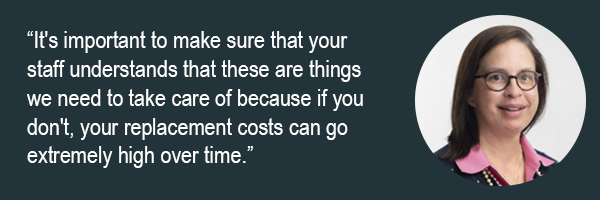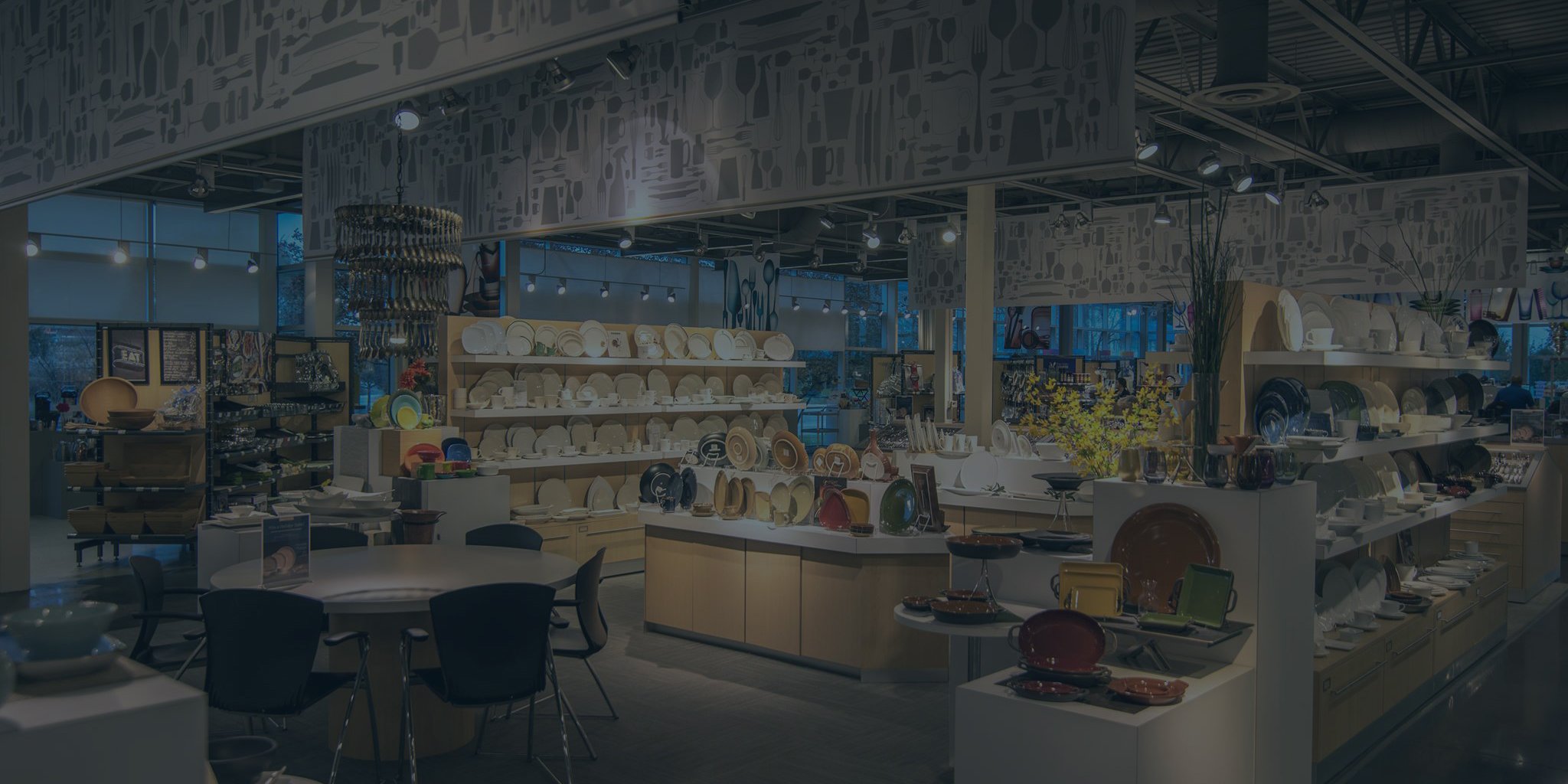Julie Pandl, Sales and Tabletop Specialist, wraps up our discussion of tabletop with this dive into proper care. Julie talks about how to avoid accidents throughout the kitchen, dining room and bar. She also talks about storage solutions and the importance of aligning yourself with a distributor.
To get started creating the perfect tabletop design, contact us today.
Excerpts
What can be done to help mitigate accidents and ensure that your tabletop components are well cared for?
Julie: You have to have enough items to make sure that you're not overusing your product. This is especially true in the glassware department. This is basic science. If you put cold ice, cold water into warm glass, that's going to cause what we call thermal shock. You want to give your glassware enough time to cool down when it comes out of the dishwasher before you put it back into service.
You're making this big tabletop purchase. You want to make sure you have enough of certain items that are used more. You want to buy a little more of those items. If you have a one plate that multiple items are going to go on, you want to have enough to make sure it's has time to rest before it goes back into circulation. It's just the nature of china and glassware.
The other thing we talk a lot about is racks, making sure you have the right ware-washing racks to put your glassware in. And every glass has a specific rack that it needs to go in when it goes through the dishwasher. This is especially important for stemware because your stems should be completely covered when they go in the dishwasher. There's a lot of rattling around that goes on in there. They are the most fragile. You want to make sure that it's well protected when it's in the dishwasher. That can also be used for storage; it's a good way to store your product.
These are two big things before you even opened the door that you want to have in place to get off on the right foot in terms of keeping the replacement costs down of your tabletop.
...
What are some of the steps that a restaurant owner can take to eventually reduce the number of accidents that might occur?
Julie: Obviously training is a piece of this puzzle. So you've got enough china and glassware, you've got your ware-washing racks, you've got proper storage, you've thought everything through. You have what you are considering to be a very durable product. If you decided that you don't have a lot of space behind your bar and you've purchased glassware that's designed to stack, those kinds of things have all been considered.
Next thing you need to do is really teach your staff about how to treat the product. That really is not terribly complicated. It involves things like not throwing too much into a bus tub, not clanging your flatware into glasses. At some point that causes little etches into the bottom of the glass. It compromises the integrity of the glass over time. Not throwing glassware, china, all those kinds of things into a bus tub. Having a clearing station that's well thought out.
It's pretty simple when you think about it, but in our industry, things move very fast. You want to have a plan in place for your staff so they can do their job without having to think it through too much. You also have a lot of people in the industry who do require training. This could be their first job. They might be 15 years old or 16 years old and they've never cleared a table. They'll throw a handled mug in with everything else with no thought to the fact that the handle will break off. Making sure that people understand that yes, we actually pay for these things and yes, they can break, but here's what we can do to mitigate that issue.
Most restaurant operators train on how to carry [a tray]. When they're choosing their china, they consider how many plates are going to go on a tray. I've had operators in our store working on their china choices, pull out a waiter tray and put the plates on the tray and lift it up just to see how heavy it was. There's things like that that need to be considered along the way. Obviously if you're doing hand service, you don't need to worry about that kind of thing. But from a clearing standpoint, that's another thing that needs to be considered because then you're clearing everything by hand as well.
It's just a matter of deciding what's going to work for your establishment and making sure that your staff understands how to separate things when they're clearing them. How to not carry too much. We've all seen a whole stack of plates going on when somebody decides to pick up too many. There's a lot of very common sense things that go on, but it's important to make sure that your staff understands that these are things we need to take care of because if you don't, your replacement costs can go extremely high over time.
 ...
...
What about the idea of pathways? What about behind the scenes in the kitchen, other things that [chefs] should be aware of or that they should handle differently?
Julie: Boelter also has a contract design division. These are things that are considered right from the get-go. Here's your indoor, here's your outdoor, here's the way the flow is going to go in the dining room. Once things get humming, your staff understands how things work. But these flow patterns are usually well thought out on the front end so that we don't have people crashing into each other.
We talk to people about how they're storing their flatware and their glassware and their plates, where they're storing and where they're coming from. Usually, you'll see a stack of plates right above and some kind of over shelf where the chefs are so they can just pull them down and use them. We talk a lot about, is your plate fully glazed? When it's sliding across your stainless steel table, is it picking up metal and depositing it on the plate that it's stacked with? We talk about that kind of thing. How thick is the profile of your plate? How much can you stack? How much should you be stacking? It's an awareness around how are we storing it, how are we handling it, what's happening to it when it slides across the table, that kind of thing.
We talked about glassware ware-washing; flatware is the same way. You want to make sure your flatware is washed standing up or not, and it doesn't sit in water. All the chemicals in a dishwasher, all the food that sits on it, that all contributes to deterioration. It takes away from the shine and the luster. Even flatware needs to be treated with delicate hands.
...
Currently, we're talking about when the restaurant is open for business, but what about after hours?
Julie: [Glass racks] are good ways to store your glassware. Obviously, you're going to have some glassware behind the bar; that's just a general storage place. It lives there because it's going to get grabbed to make a drink. When it's not in service, I would suggest things like a glass rack.
We have plate dollies, where you can put different size plates in. Some people call them the poker chip dollies. You can adjust the sizing so you can store your dinner plates that are just coming out of the dishwasher. They're well protected. Those dollies are typically on wheels – you can move them around, so nobody's trying to carry them.
There are flatware bins where it's all separated out. Once it's out of the dishwasher and it's been wiped off and it's ready to go, you store it in a bin. It's, again, not very complicated. But there are tools out there to make sure it's getting done properly.
...
Are there alternatives out there that restaurant owners should consider that may not break as easily?
Julie: When we get a call with a lot of breakage, we look at it and say, "Is this a chipping issue?" Because plates will chip. Most manufacturers have chip warranties; some are three years, some are five years, some are lifetime. Sometimes it can be just a simple issue of chipping for whatever reason. We can get that replaced, which is another good reason to work with your distributor.
But when you're having a lot of breakage, the first thing I would do is look at how my staff is handling the items. While china does break, just because of the nature of how it's made, it really shouldn't just be breaking on you. You shouldn’t have tons of tons of costs and the replacement of your china, depending on what you get.
If you're having a lot of breakage, it might be time to look at something that is a little more durable. Maybe you decided to buy a more commodity china that wasn't as durable as say something out of the UK. There's different grades of durability in the china department. We can certainly take a look at something like that if you're having a breakage issue. Same is true with glassware, there's different levels of durability.
Depending on your establishment, there's also melamine out there. That's not right for everybody, but it can work really well in certain places.
...
For those restaurants that have an outdoor space, should they be considering alternate options for those seatings?
Julie: A lot of them do. We get a lot of "We have an outdoor space, we have a patio, what can we do that's going to give us a cohesive look with our indoor tabletop?"
In the past seven to nine years, the quality and the look and the clarity [of plastic drinkware] has just gone skyrocketing. It's very nice. You wouldn't know it's plastic by looking at it. You'd have to put in hold it in your hand. So we have definitely seen a definite uptick in plastic drinkware. And lots of shapes to choose from. It's not just a mixing glass. It's not just a rocks glass. There's wine glasses, champagne glasses, pilsners, pub glasses. There's every option out there. It's all designed for commercial use. What we sell can go through a commercial dishwasher. It's tested against the chemicals, so it's going to last a long time before it gets cloudy.
And then melamine. Melamine, for people who don't know what it is, it's basically a type of plastic, but it's a very durable, thick plastic product. It can go in the microwave, it can go in a commercial dishwasher. We've also seen an explosion of creativity in the melamine department. Again, you wouldn't know it's melamine until you touch it.
There's a lot of options out there for people for outdoor dining in the plastic melamine department. Really fun colors, with the organic shapes. Melamine is sort of following the tabletop trends in general. And we're getting restaurants that [are] using melamine. It's not cheap. It's not necessarily that much less expensive and may be equal to a china plate. But it'll last longer, so the replacement cost is much lower.
...
What are the expectations with a distributor relationship when products are being damaged?
Julie: We take it very seriously. If we have a salesperson who has a quality issue, I get these calls. We're on it right away because this is part of the way we stand behind what we do.
Typically what we start with is we're going to replace the chipped product. If on opening your order, anything comes in broken – because again it's china, it will break when it's traveling in a truck – that gets replaced immediately. If it's an ongoing problem, then we'll go in and watch how the china is handled to see if there's some tick in the process that we can eliminate.
Rarely does it mean you have to change product, but sometimes it means that. It may be the same manufacturer, but it's a different piece. It's a little more durable. It's got a little thicker rim on it. It's a matter of evaluating the process.
This is something that I don't know how many operators are going to figure that out on their own. When they have chipping issues, it's irritating. They want to have somebody to go to, to say, "Help me solve this problem." And that's why we're there.
One thing I would say to operators out there is plan ahead. With all the great trends that are out there with all the unique pieces, manufacturers have a tough time forecasting. They're not sure what's going to work and what isn't. Your product might be coming from overseas, and it might take a while. It's important to plan ahead if you want to avoid that. Usually we can find a solution even if we do have a disaster like that.
Want to chat with a tabletop expert? Get in touch!

The Boelter Wire is an episodic podcast that focuses on thought-leadership conversations with industry experts and established partners, and is designed to help listeners evolve their business, stay competitive and pursue their passions.
Subscribe to The Boelter Wire here or on Spotify, Google Play, Apple Podcasts or Amazon Music.
.jpg?width=192&name=BLT_Only_Logo_Black%20(19).jpg)



